Corey Redekop's Blog, page 39
October 25, 2011
Tiny Monkey droppings - The Sisters Brothers by Patrick deWitt
The Sisters Brothers (Anansi, 2011)
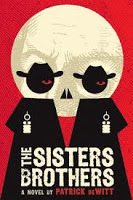 by Patrick deWitt
by Patrick deWitt
Description (from the publisher)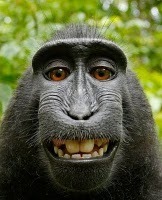 What the Tiny Monkey thinks
What the Tiny Monkey thinks
If I hadn't recently read Charles Portis' classic western True Grit , I would have claimed The Sisters Brothers to have a glorious style and cadence utterly unique to me. I can see that deWitt has perhaps co-opted the overall style of another (an arguable point, as his first novel Ablutions [a terrific read as well] has much of the same voice), but who cares when the result is this much fun? Very likely my favourite read of 2011, deWitt has created a profane, violent, funny, and just plain awesome piece of work, and the fact that this novel—written by a Canadian who has long made the U.S. his home, and with nary a mention of Canada anywhere—is up for major Canadian awards tickles me. deWitt's dialogue is superb, laden with dry wit, and the characters of Eli and Charlie are wonderfully done, the perfect mixture of psychotic killers and melancholy dreamers. Some have complained that deWitt's style is too 'cinematic' to be considered literature (who ever complained of a movie being too literate?); I say, it's not the story, it's how you tell it, and deWitt tells his story superbly in a style that completely suits the story. I wish more novels were this bloody alive: dialogue as rich, subtle, and memorable as this is hardly any easier than obtuse poetic descriptions of windswept Canada prairies (I'm being snarky, I know, sue me). The cinematic possibilities are present, of course—the Coen brothers desperately need to get their hands on this; keep John C. Reilly as Eli, add Philip Seymour Hoffman as Charlie—but merely because a movie can be envisioned is no excuse for needless denigration. The Sisters Brothers is a major achievement, as gutsy and vital and just damned entertaining a novel as you could hope for.
TINY MONKEY ADORES

 by Patrick deWitt
by Patrick deWittDescription (from the publisher)
Hermann Kermit Warm is going to die. Eli and Charlie Sisters can be counted on for that. Though Eli has never shared his brother's penchant for whiskey and killing, he's never known anything else. On the road to Warm's gold-mining claim outside San Francisco—and from the back of his long-suffering one-eyed horse—Eli struggles to make sense of his life without abandoning the job he's sworn to do.
DeWitt spins a violent, lustful, hung-over and humorous odyssey through the underworld of the 1850s frontier. Doffing his hat to the classic Western, he then transforms it into a comic tour-de-force with an unforgettable narrative voice that captures all the absurdity, melancholy, and grit of the West -- and of these two brothers, bound to each other by blood and scars and love.
Film rights have been sold to actor John C. Reilly's production company in a major deal, with Reilly to play one of the brothers.
 What the Tiny Monkey thinks
What the Tiny Monkey thinks If I hadn't recently read Charles Portis' classic western True Grit , I would have claimed The Sisters Brothers to have a glorious style and cadence utterly unique to me. I can see that deWitt has perhaps co-opted the overall style of another (an arguable point, as his first novel Ablutions [a terrific read as well] has much of the same voice), but who cares when the result is this much fun? Very likely my favourite read of 2011, deWitt has created a profane, violent, funny, and just plain awesome piece of work, and the fact that this novel—written by a Canadian who has long made the U.S. his home, and with nary a mention of Canada anywhere—is up for major Canadian awards tickles me. deWitt's dialogue is superb, laden with dry wit, and the characters of Eli and Charlie are wonderfully done, the perfect mixture of psychotic killers and melancholy dreamers. Some have complained that deWitt's style is too 'cinematic' to be considered literature (who ever complained of a movie being too literate?); I say, it's not the story, it's how you tell it, and deWitt tells his story superbly in a style that completely suits the story. I wish more novels were this bloody alive: dialogue as rich, subtle, and memorable as this is hardly any easier than obtuse poetic descriptions of windswept Canada prairies (I'm being snarky, I know, sue me). The cinematic possibilities are present, of course—the Coen brothers desperately need to get their hands on this; keep John C. Reilly as Eli, add Philip Seymour Hoffman as Charlie—but merely because a movie can be envisioned is no excuse for needless denigration. The Sisters Brothers is a major achievement, as gutsy and vital and just damned entertaining a novel as you could hope for.
TINY MONKEY ADORES
Published on October 25, 2011 16:35
October 23, 2011
Book Covers: After Dark! (a short film)
In a little slice of heaven, acclaimed (deservedly) director Spike Jones, along with director Simon Cahn, has taken over 3,000 pieces of felt and put together a wonderful animated hypothesis as to what happens on book covers when the lights go out.
Bittersweet, gorgeous, and a little bit naughty, Mourir Auprès de Toi ("To Die By Your Side") tickles this shelf monkey in all the best places.
Spike Jonze: Mourir Auprès de Toi on Nowness.com.
My thanks to the good folks at io9.com for the heads-up.
Bittersweet, gorgeous, and a little bit naughty, Mourir Auprès de Toi ("To Die By Your Side") tickles this shelf monkey in all the best places.
Spike Jonze: Mourir Auprès de Toi on Nowness.com.
My thanks to the good folks at io9.com for the heads-up.
Published on October 23, 2011 09:32
October 16, 2011
Monkey droppings - Damned by Chuck Palahniuk
Today, the monkey holds his breath as he steels his nerve for another annual onslaught of Palahniukian proportions.
Will Chuck return to form? Or will he continue his sad descent towards irrelevancy?
The monkey, being a cautious optimist, refuses to bet either way.
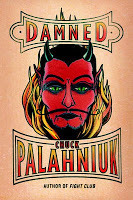 Damned (Doubleday Canada, 2011)by Chuck Palahniuk
Damned (Doubleday Canada, 2011)by Chuck Palahniuk
Then came Snuff , a divisive work about a porn star striving to break the record for most conjugal partners in one day. Many hated it; I found much to admire, although there was the sense of Chuck spinning his wheels a little. After Lullaby travelled into magical realism, Diary showed a growth to other genres (reminding me much of Rosemary's Baby ), and Rant displayed a razor-sharp style akin to J.G. Ballard, Snuff seemed a step back.
And then came Pygmy , a limp terrorist satire that vastly outstayed it's welcome and became the first Palahniuk novel to ever become outright boring.
And then came Tell-All, about which the less said, the better (but if you are inclined, here's a link to my review, and another link discussing his publisher's dishonest promotional techniques concerning said review).
But being the cautious optimist that I am, Damned looked like fun. Described as a Judy Blume novel set in Hell, it promised an unusual experience, and (hopefully) a return to Chuck's glory days.
Annnnnnnnd . . . meh.
Damned is the tale of young Maddie Spencer, the thirteen-year-old daughter of a movie star and a real estate tycoon who crosses the threshold of life during an ill-advised exploration of drug use. Maddie, through her wicked ways, has been condemned to Hell (as, it turns out, will most of us):
After a time in Hell, during which our heroine escapes and trudges past the Sea of Insects, the Great Plains of Broken Glass, the Ocean of Wasted Sperm, and the Swamp of Partial-birth Abortions, Maddie finds herself a job in one of the two major areas of Hellish employment; telemarketing (the other area is Internet porn). Maddie finds that she has a knack for it, and soon her organizational skills come to the fore, and it turns out that Hell may be exactly the terrain where Maddie can finally shine.
As I said, Damned is not without charm, if one can affix the descriptor 'charm' to anything Palahniuk writes. He has plainly done some research into literary depictions of the abode of the damned, and his eternal plane of misery is a vividly-described wasteland of torment. Palahniuk has not, it seems, lost his knack for shock, evident in a gruesome scene wherein Maddie uses the severed head of the punk to sexually gratify a particularly nasty demon. And when Damned starts to ultimately become an afterlife bildungsroman, the novel finally begins to catch the reader's attention.
But there's a laziness afoot. Comments that The English Patient and The Piano are the only movies that play in Hell smacks of an exhaustion of imagination. Ditto the concept of telemarketers as damned souls reaching out to make human contact, an idea not nearly as clever as Palahniuk thinks. The plot never decides what, exactly, it is satirizing, and there isn't enough energy to propel the plot over its massive rough spots. Damned is hardly as lazy a product as Tell-All, but it doesn't have enough sustained imagination to lift it past, say, Snuff.
Damned is hardly the worst thing ever, not nearly even the worst thing Palahniuk has written. There are sparks of effort, and near the end, when the narrative gains some momentum, the story begins to actually involve the reader beyond a superficial appreciation of Palahniuk's wilting wit. Damned could be seen as notice that Chuck is not yet spent, that there are reservoirs he has not yet tapped. But the man is treading water when he should be swimming.
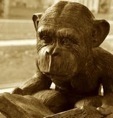 VERDICT: THE MONKEY TRIED. LORD, HOW HE DID TRY. BUT HE'S GOING TO GO RE-READ LULLABY FOR A PICK-ME-UP.
VERDICT: THE MONKEY TRIED. LORD, HOW HE DID TRY. BUT HE'S GOING TO GO RE-READ LULLABY FOR A PICK-ME-UP.

Will Chuck return to form? Or will he continue his sad descent towards irrelevancy?
The monkey, being a cautious optimist, refuses to bet either way.
 Damned (Doubleday Canada, 2011)by Chuck Palahniuk
Damned (Doubleday Canada, 2011)by Chuck PalahniukSo begins Damned, Chuck Palahniuk's newest foray into obscenity-laden satire. As a fan of Chuck's works, I once looked forward to each new novel with a tingling sensation in my nethers. Chuck was a carnival barker extraordinaire, an energetic guide to a literary freak show of humanity's worst traits. It wasn't for everyone, but when Chuck was on fire (see: Fight Club , Choke , Lullaby , Rant ), there were few who could compare.Are you there, Satan? It's me, Madison. I'm just now arrived here, in Hell, but it's not my fault except for maybe dying from an overdose of marijuana. Maybe I'm in Hell because I'm fat--a Real Porker. If you can go to Hell for having low self-esteem, that's why I'm here. I wish I could lie and tell you I'm bone-thin with blond hair and big ta-tas. But, trust me, I'm fat for a really good reason.
Then came Snuff , a divisive work about a porn star striving to break the record for most conjugal partners in one day. Many hated it; I found much to admire, although there was the sense of Chuck spinning his wheels a little. After Lullaby travelled into magical realism, Diary showed a growth to other genres (reminding me much of Rosemary's Baby ), and Rant displayed a razor-sharp style akin to J.G. Ballard, Snuff seemed a step back.
And then came Pygmy , a limp terrorist satire that vastly outstayed it's welcome and became the first Palahniuk novel to ever become outright boring.
And then came Tell-All, about which the less said, the better (but if you are inclined, here's a link to my review, and another link discussing his publisher's dishonest promotional techniques concerning said review).
But being the cautious optimist that I am, Damned looked like fun. Described as a Judy Blume novel set in Hell, it promised an unusual experience, and (hopefully) a return to Chuck's glory days.
Annnnnnnnd . . . meh.
Damned is the tale of young Maddie Spencer, the thirteen-year-old daughter of a movie star and a real estate tycoon who crosses the threshold of life during an ill-advised exploration of drug use. Maddie, through her wicked ways, has been condemned to Hell (as, it turns out, will most of us):
Maddie spends her days in a cage, keeping her spirits up through hasty friendships with nearby cellmates, a Breakfast Club sandwich of a jock, a nerd, a prom queen, a punk, and herself (which makes her theAs it turns out, the way-fundamentalist Christian creationists were correct. How I wish I could tell my parents: Everybody in Kansas was right. Yes, the inbred snake-handlers and holy rollers had more on the ball than my secular humanist, billionaire mom and dad. The dark forces of evil really did plant those dinosaur bones and fake fossil records to mislead mankind. Evolution was hokum, and we fell for it hook, line, and sinker.
Damned is not without it's charms, one of which, unfortunately, is not Maddie Spencer, as annoying a protagonist as you could imagine. Part of this is because of Palahniuk's by-now-familiar style of meta; Maddie is forever reminding the reader that she is not an idiot, that she understands certain words, that she is smart. "Yes, I know the word absentia," she pouts. "I'm thirteen years old, not stupid - and being dead, ye gods, do I comprehend the idea of absentia." After a short time, these asides speed past precocious/cute and run headlong into precocious/put her outside already. Maddie never becomes a believable character, and her voice often grates with the worst tendencies of Palahniuk.If anything, life in Hell is like a vintage Warner Bros. cartoon where characters are forever getting decapitated by guillotines and dismembered by dynamite explosions, then being completely restored in time for the next assault. It's a system not without both it's comfort and it's monotony.
After a time in Hell, during which our heroine escapes and trudges past the Sea of Insects, the Great Plains of Broken Glass, the Ocean of Wasted Sperm, and the Swamp of Partial-birth Abortions, Maddie finds herself a job in one of the two major areas of Hellish employment; telemarketing (the other area is Internet porn). Maddie finds that she has a knack for it, and soon her organizational skills come to the fore, and it turns out that Hell may be exactly the terrain where Maddie can finally shine.
As I said, Damned is not without charm, if one can affix the descriptor 'charm' to anything Palahniuk writes. He has plainly done some research into literary depictions of the abode of the damned, and his eternal plane of misery is a vividly-described wasteland of torment. Palahniuk has not, it seems, lost his knack for shock, evident in a gruesome scene wherein Maddie uses the severed head of the punk to sexually gratify a particularly nasty demon. And when Damned starts to ultimately become an afterlife bildungsroman, the novel finally begins to catch the reader's attention.
But there's a laziness afoot. Comments that The English Patient and The Piano are the only movies that play in Hell smacks of an exhaustion of imagination. Ditto the concept of telemarketers as damned souls reaching out to make human contact, an idea not nearly as clever as Palahniuk thinks. The plot never decides what, exactly, it is satirizing, and there isn't enough energy to propel the plot over its massive rough spots. Damned is hardly as lazy a product as Tell-All, but it doesn't have enough sustained imagination to lift it past, say, Snuff.
Damned is hardly the worst thing ever, not nearly even the worst thing Palahniuk has written. There are sparks of effort, and near the end, when the narrative gains some momentum, the story begins to actually involve the reader beyond a superficial appreciation of Palahniuk's wilting wit. Damned could be seen as notice that Chuck is not yet spent, that there are reservoirs he has not yet tapped. But the man is treading water when he should be swimming.
 VERDICT: THE MONKEY TRIED. LORD, HOW HE DID TRY. BUT HE'S GOING TO GO RE-READ LULLABY FOR A PICK-ME-UP.
VERDICT: THE MONKEY TRIED. LORD, HOW HE DID TRY. BUT HE'S GOING TO GO RE-READ LULLABY FOR A PICK-ME-UP.
Published on October 16, 2011 12:02
September 29, 2011
Tiny Monkey droppings - YOU comma Idiot by Doug Harris
YOU comma Idiot (Goose Lane Editions, 2010) by Doug Harris
by Doug Harris
Description (from the publisher) What the Tiny Monkey thinks
What the Tiny Monkey thinks
Full disclosure time; I am a publicist for Goose Lane. This is a Goose Lane product. Ergo, you cannot possibly trust my opinion. But if you do, my opinion is that not only does Goose Lane release some of the best literature this country is capable of (see: this year's wholly remarkable quartet of The Town that Drowned, The Time We All Went Marching, Tide Road, and Kalila ), but last year's YOU comma Idiot is one of the best, and my favourite novel of 2010 (only reviewing on the blog now to avoid charges of favouritism and conflict of interest). Writing in the second person, a format only off-putting for the first paragraph, Harris' tale of a low-level drug dealer eking out his existence in Montreal by doing as little as humanly possible is a treat on every level. His dialogue is the highlight, as crunchy as Elmore Leonard and quick-witted as Nick Hornby, but his empathy for character and his sharpness in motivation and plotting keeps the novel humming. So sure of itself, so fleet-footed yet grounded, it is hard to believe this is a debut novel. It's as entertaining as anything out there, better written than most, and it's lack of presence on major awards lists is a devastating oversight by people who cannot comprehend that just because it's funny, that doesn't mean it's undeserving of attention.
TINY MONKEY ADORES

 by Doug Harris
by Doug HarrisDescription (from the publisher)
Marginalized and alienated, perennial fuck-up Lee Goodstone is a resounding zero: a small-time hash-dealing slacker with no ambition about where his life isn't going. One morning, Honey, his best friend's girlfriend, inexplicably jumps into bed with him. Then another friend, Henry, is accused of kidnapping a teenaged girl no one knew he was seeing. Lee gets embroiled in the mêlée, finds himself making flip remarks to the media, and his mediocre existence officially spirals out of control.
Told in the second person, YOU comma Idiot is a cringeworthy, laugh-out-loud flight on the wings of the protagonist. The roller-coaster ride of a plot leads at breakneck speed to places even Lee can't anticipate.
 What the Tiny Monkey thinks
What the Tiny Monkey thinks Full disclosure time; I am a publicist for Goose Lane. This is a Goose Lane product. Ergo, you cannot possibly trust my opinion. But if you do, my opinion is that not only does Goose Lane release some of the best literature this country is capable of (see: this year's wholly remarkable quartet of The Town that Drowned, The Time We All Went Marching, Tide Road, and Kalila ), but last year's YOU comma Idiot is one of the best, and my favourite novel of 2010 (only reviewing on the blog now to avoid charges of favouritism and conflict of interest). Writing in the second person, a format only off-putting for the first paragraph, Harris' tale of a low-level drug dealer eking out his existence in Montreal by doing as little as humanly possible is a treat on every level. His dialogue is the highlight, as crunchy as Elmore Leonard and quick-witted as Nick Hornby, but his empathy for character and his sharpness in motivation and plotting keeps the novel humming. So sure of itself, so fleet-footed yet grounded, it is hard to believe this is a debut novel. It's as entertaining as anything out there, better written than most, and it's lack of presence on major awards lists is a devastating oversight by people who cannot comprehend that just because it's funny, that doesn't mean it's undeserving of attention.
TINY MONKEY ADORES
Published on September 29, 2011 07:47
September 27, 2011
Tiny Monkey droppings - Idaho Winter by Tony Burgess
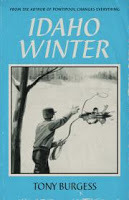 Idaho Winter (ECW Press, 2011)by Tony Burgess
Idaho Winter (ECW Press, 2011)by Tony BurgessDescription (from the publisher)
Idaho Winter begins as the story of a boy with an extraordinarily painful existence. He is, through no fault of his own, loathed by everyone in the town where he lives. His father, Early Winter, feeds him roadkill for breakfast. The crossing guard steers cars toward him as he crosses the road. Parents encourage their children to plot cruelly against him. One morning Idaho finds it too much to bear and hides down by the river where he meets Madison. Madison, astonishingly, is as hurt by how he's treated as he is. For the first time in his life Idaho experiences someone's empathy and it opens a terrible world of pain in him. He dotes on Madison, in awe of her, and he cleans her muddy feet in the river, drying them with his shirt. Suddenly, hunting dogs descend on the scene and, trained to attack the smell of Idaho, set their jaws on Madison's feet.
Then Idaho does something that changes everything. He gets up and runs home. Not so strange until the author realizes that this part was never written. Idaho becomes enraged upon learning that his suffering has been cruelly designed by a clumsy writer who confesses that he made his book meaner than all the others so it would stand out. Idaho locks the author in a closet and runs off, armed with the knowledge that the entire world is invented and that he has the power now to imagine it differently.
When the author emerges from the closet he finds that his novel is now unrecognizable. Phantoms and monsters, beasts from the boy's angry thoughts now dominate the streets. Beneath the earth there is a resistance movement of secondary characters, including the poor Madison who is now bedridden and what's more: anyone who comes within 50 feet of her is paralyzed with sadness and cannot move or be moved. The author sets out with these characters to cure the novel, to find a way to bring its mind and heart together as they embark on a journey as perilous and paradoxical as anything HG Wells or Lewis Carroll ever imagined.
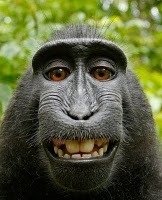 What the Tiny Monkey Thinks
What the Tiny Monkey ThinksTony Burgess is a madman. A lovely madman, fun to talk to, kind and gentle, but a madman nonetheless, capable of unnerving a reader in a few short sentences. And Idaho Winter is unnerving for many reasons, not the least for being the most unhinged novel written for young adults since Lewis Carroll unleashed his fantasies on poor little Alice. Yet what else could you hope to expect from the author of Pontypool Changes Everything , the definitive Canadian zombie novel (and one freaky great film to boot). Idaho Winter is a mindf#@k of astonishing proportions, an excursion into a world where the rules simply don't apply. I thought I detected a theme of writers block at one point, as the unnamed narrator bemoans the fact that he doesn't have a clue where his character has gone or what he'll do (a sensation I'm sure all authors can relate to). There are breaths of Luigi Pirandello's absurdist masterpiece Six Characters in Search of an Author throughout Burgess' imaginative weirdscape, breaths that intermingle with the surrealism of Luis Buñuel, the paranoia of Franz Kafka and David Lynch, and the dream imagery of Salvador Dali. Idaho Winter is spectacularly peculiar, demanding, funny, gross, and unforgettable. If young adults are looking for tales of Twilight-like romance, stay far away; if they are yearning for real risk and reward in their literature, this should be just the ticket.Idaho is walking slowly. His feet are sore from deep dog bites and his stomach is roiling with the maggoty paw his father forced him to eat. It's hard to say what Idaho really looks like. His hair is probably brown, but it's so matted down with the dung of bedbugs that it could be red. His eyes, I've never seen; they are more than merely lowered; they are hidden, hooded, sunken back. Not enough nutrition in him to light them, maybe, or just no reason for them to look out. His hands are puffy, but I don't think he's a large boy; it may be that his extremities are swollen from the infectious mouths that bite him while he sleeps or just lies there, as he does, all summer — an unmoving unfortunate boy with no reason to rise.
Tiny Monkey Loves
Published on September 27, 2011 16:15
September 20, 2011
Tiny Monkey droppings - The Cut by George Pelecanos
The Cut (Reagan Arthur Books, 2011)
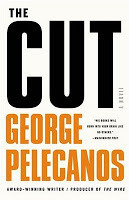 by George Pelecanos
by George Pelecanos
Description (from the publisher) What the Tiny Monkey Thinks
What the Tiny Monkey Thinks
If there is a class to be taught on how to write simply, succinctly, and yet achieve an impact like a punch to the gut, George Pelecanos is the teacher (or at least co-teacher with Elmore Leonard and Walter Mosley). The Cut has nary one wasted word, not one superfluous scene, not fat to trim, yet it brims with astonishingly precise characterizations, brings Washington D.C. to life like few others have achieved, and is a mother of a mover to boot. I've only partaken of a few of Pelecanos' many works (and have not yet seen any of his television series The Wire , which everyone in the universe tells me is the best thing ever created in the history of everything by anybody), but there's no denying he's among the best of his breed. The Cut, however, seems a little light when compared to some of his previous efforts such as Hard Revolution ; it's compulsively readable, but it doesn't linger in the soul the way his best do. Yet it's a spiffy crime thriller with a great lead in Lucas, an inventive investigator who knows his way around the streets. Lucas is flawed, magnetic, and deeply human, with echoes of Mosley's Easy Rawlins. The Cut may not be Pelecanos' best, but it's a tight, tough, and brutal novel that doubtless will be a series to be savoured.
Tiny Monkey Greatly Enjoys the Ride
 by George Pelecanos
by George PelecanosDescription (from the publisher)
Meet Spero Lucas—the newest literary hero from George Pelecanos, New York Times bestselling author and writer for The Wire.
Spero Lucas has a new line of work. Since he returned home after serving in Iraq, he has been doing special investigations for a defense attorney. He's good at it, and he has carved out a niche: recovering stolen property, no questions asked. His cut is forty percent.
A high-profile crime boss who has heard of Lucas's specialty hires him to find out who has been stealing from his operation. It's the biggest job Lucas has ever been offered, and he quickly gets a sense of what's going on. But before he can close in on what's been taken, he tangles with a world of men whose amorality and violence leave him reeling. Is any cut worth your family, your lover, your life?
Lucas Spero is George Pelecanos's greatest creation, a young man making his place in the world one battle and one mission at a time. The first in a new series of thrillers featuring Spero Lucas, The Cut is new confirmation of why George Pelecanos is "perhaps America's greatest living crime writer." (Stephen King).
 What the Tiny Monkey Thinks
What the Tiny Monkey ThinksIf there is a class to be taught on how to write simply, succinctly, and yet achieve an impact like a punch to the gut, George Pelecanos is the teacher (or at least co-teacher with Elmore Leonard and Walter Mosley). The Cut has nary one wasted word, not one superfluous scene, not fat to trim, yet it brims with astonishingly precise characterizations, brings Washington D.C. to life like few others have achieved, and is a mother of a mover to boot. I've only partaken of a few of Pelecanos' many works (and have not yet seen any of his television series The Wire , which everyone in the universe tells me is the best thing ever created in the history of everything by anybody), but there's no denying he's among the best of his breed. The Cut, however, seems a little light when compared to some of his previous efforts such as Hard Revolution ; it's compulsively readable, but it doesn't linger in the soul the way his best do. Yet it's a spiffy crime thriller with a great lead in Lucas, an inventive investigator who knows his way around the streets. Lucas is flawed, magnetic, and deeply human, with echoes of Mosley's Easy Rawlins. The Cut may not be Pelecanos' best, but it's a tight, tough, and brutal novel that doubtless will be a series to be savoured.
Tiny Monkey Greatly Enjoys the Ride
Published on September 20, 2011 16:18
Tiny Monkey - The Cut by George Pelecanos
The Cut (Reagan Arthur Books, 2011)
 by George Pelecanos
by George Pelecanos
Description (from the publisher) What the Tiny Monkey Thinks
What the Tiny Monkey Thinks
If there is a class to be taught on how to write simply, succinctly, and yet achieve an impact like a punch to the gut, George Pelecanos is the teacher (or at least co-teacher with Elmore Leonard and Walter Mosley). The Cut has nary one wasted word, not one superfluous scene, not fat to trim, yet it brims with astonishingly precise characterizations, brings Washington D.C. to life like few others have achieved, and is a mother of a mover to boot. I've only partaken of a few of Pelecanos' many works (and have not yet seen any of his television series The Wire , which everyone in the universe tells me is the best thing ever created in the history of everything by anybody), but there's no denying he's among the best of his breed. The Cut, however, seems a little light when compared to some of his previous efforts such as Hard Revolution ; it's compulsively readable, but it doesn't linger in the soul the way his best do. Yet it's a spiffy crime thriller with a great lead in Lucas, an inventive investigator who knows his way around the streets. Lucas is flawed, magnetic, and deeply human, with echoes of Mosley's Easy Rawlins. The Cut may not be Pelecanos' best, but it's a tight, tough, and brutal novel that doubtless will be a series to be savoured.
Tiny Monkey Greatly Enjoys the Ride
 by George Pelecanos
by George PelecanosDescription (from the publisher)
Meet Spero Lucas—the newest literary hero from George Pelecanos, New York Times bestselling author and writer for The Wire.
Spero Lucas has a new line of work. Since he returned home after serving in Iraq, he has been doing special investigations for a defense attorney. He's good at it, and he has carved out a niche: recovering stolen property, no questions asked. His cut is forty percent.
A high-profile crime boss who has heard of Lucas's specialty hires him to find out who has been stealing from his operation. It's the biggest job Lucas has ever been offered, and he quickly gets a sense of what's going on. But before he can close in on what's been taken, he tangles with a world of men whose amorality and violence leave him reeling. Is any cut worth your family, your lover, your life?
Lucas Spero is George Pelecanos's greatest creation, a young man making his place in the world one battle and one mission at a time. The first in a new series of thrillers featuring Spero Lucas, The Cut is new confirmation of why George Pelecanos is "perhaps America's greatest living crime writer." (Stephen King).
 What the Tiny Monkey Thinks
What the Tiny Monkey ThinksIf there is a class to be taught on how to write simply, succinctly, and yet achieve an impact like a punch to the gut, George Pelecanos is the teacher (or at least co-teacher with Elmore Leonard and Walter Mosley). The Cut has nary one wasted word, not one superfluous scene, not fat to trim, yet it brims with astonishingly precise characterizations, brings Washington D.C. to life like few others have achieved, and is a mother of a mover to boot. I've only partaken of a few of Pelecanos' many works (and have not yet seen any of his television series The Wire , which everyone in the universe tells me is the best thing ever created in the history of everything by anybody), but there's no denying he's among the best of his breed. The Cut, however, seems a little light when compared to some of his previous efforts such as Hard Revolution ; it's compulsively readable, but it doesn't linger in the soul the way his best do. Yet it's a spiffy crime thriller with a great lead in Lucas, an inventive investigator who knows his way around the streets. Lucas is flawed, magnetic, and deeply human, with echoes of Mosley's Easy Rawlins. The Cut may not be Pelecanos' best, but it's a tight, tough, and brutal novel that doubtless will be a series to be savoured.
Tiny Monkey Greatly Enjoys the Ride
Published on September 20, 2011 16:18
September 18, 2011
Tiny Monkey droppings - The Bookman by Lavie Tidhar
The Bookman (Angry Robot, 2010)
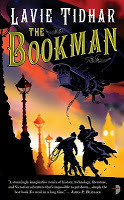 by Lavie Tidhar
by Lavie Tidhar
Description (from the publisher)
 What the Tiny Monkey Thinks
What the Tiny Monkey Thinks
This is a type of book I'm beginning to refer to as a Dog's Breakfast Novel; it's messy, there's a little bit of everything, and hopefully it's palatable to the tongue and not simply snouts and entrails. What I mean is, the author seemingly throws everything into the mix, and in order for it to work, it better have verve, style, and entertainment value galore, or it's going to be really sticky (Gord Zajac's recent Major Karnage is another such example). Luckily, Lavie Tidhar (of the gloriously weird Tel Aviv Dossier ) has style to spare, and his steampunk adventure novel echoes Verne and Wells while reviving the go-for-broke cliffhanger style of classic pulp fiction. Tidhar's narrative — set in an alternative history Victorian England where automatons converse with humans, martian probes are being launched into space, and intelligent lizards rule the land —is a hodge-podge of indelibly cool ideas and gee-whiz enthusiasm, wrapped in loving affection for the genre and its progenitors. Tidhar has great fun mixing historical personalities such as Karl Marx and Jules Verne with fictional heroes of the time, and the pages are rife with in-jokes for the literary crowd. I cannot say as I fully understood the complexities of the plot (it gets sensationally strange at times), but as Orphan's adventures unraveled, taking him from the slums of London to the high seas to the shore of mysterious islands, I found I didn't care one whit. I'll be looking up The Bookman's sequel Camera Obscura as soon as I can.
Tiny Monkey Greatly Enjoys the Ride
 by Lavie Tidhar
by Lavie TidharDescription (from the publisher)
When his beloved is killed in a terrorist atrocity committed by the sinister Bookman, young poet Orphan becomes enmeshed in a web of secrets and lies. His quest to uncover the truth takes him from the hidden catacombs of a London on the brink of revolution, through pirate-infested seas, to the mysterious island that may hold the secret to the origin, not only of the shadowy Bookman, but of Orphan himself…
 What the Tiny Monkey Thinks
What the Tiny Monkey ThinksThis is a type of book I'm beginning to refer to as a Dog's Breakfast Novel; it's messy, there's a little bit of everything, and hopefully it's palatable to the tongue and not simply snouts and entrails. What I mean is, the author seemingly throws everything into the mix, and in order for it to work, it better have verve, style, and entertainment value galore, or it's going to be really sticky (Gord Zajac's recent Major Karnage is another such example). Luckily, Lavie Tidhar (of the gloriously weird Tel Aviv Dossier ) has style to spare, and his steampunk adventure novel echoes Verne and Wells while reviving the go-for-broke cliffhanger style of classic pulp fiction. Tidhar's narrative — set in an alternative history Victorian England where automatons converse with humans, martian probes are being launched into space, and intelligent lizards rule the land —is a hodge-podge of indelibly cool ideas and gee-whiz enthusiasm, wrapped in loving affection for the genre and its progenitors. Tidhar has great fun mixing historical personalities such as Karl Marx and Jules Verne with fictional heroes of the time, and the pages are rife with in-jokes for the literary crowd. I cannot say as I fully understood the complexities of the plot (it gets sensationally strange at times), but as Orphan's adventures unraveled, taking him from the slums of London to the high seas to the shore of mysterious islands, I found I didn't care one whit. I'll be looking up The Bookman's sequel Camera Obscura as soon as I can.
Tiny Monkey Greatly Enjoys the Ride
Published on September 18, 2011 12:16
Tiny Monkey - The Bookman by Lavie Tidhar
The Bookman (Angry Robot, 2010)
 by Lavie Tidhar
by Lavie Tidhar
Description (from the publisher)
 What the Tiny Monkey Thinks
What the Tiny Monkey Thinks
This is a type of book I'm beginning to refer to as a Dog's Breakfast Novel; it's messy, there's a little bit of everything, and hopefully it's palatable to the tongue and not simply snouts and entrails. What I mean is, the author seemingly throws everything into the mix, and in order for it to work, it better have verve, style, and entertainment value galore, or it's going to be really sticky (Gord Zajac's recent Major Karnage is another such example). Luckily, Lavie Tidhar (of the gloriously weird Tel Aviv Dossier ) has style to spare, and his steampunk adventure novel echoes Verne and Wells while reviving the go-for-broke cliffhanger style of classic pulp fiction. Tidhar's narrative — set in an alternative history Victorian England where automatons converse with humans, martian probes are being launched into space, and intelligent lizards rule the land —is a hodge-podge of indelibly cool ideas and gee-whiz enthusiasm, wrapped in loving affection for the genre and its progenitors. Tidhar has great fun mixing historical personalities such as Karl Marx and Jules Verne with fictional heroes of the time, and the pages are rife with in-jokes for the literary crowd. I cannot say as I fully understood the complexities of the plot (it gets sensationally strange at times), but as Orphan's adventures unraveled, taking him from the slums of London to the high seas to the shore of mysterious islands, I found I didn't care one whit. I'll be looking up The Bookman's sequel Camera Obscura as soon as I can.
Tiny Monkey Greatly Enjoys the Ride
 by Lavie Tidhar
by Lavie TidharDescription (from the publisher)
When his beloved is killed in a terrorist atrocity committed by the sinister Bookman, young poet Orphan becomes enmeshed in a web of secrets and lies. His quest to uncover the truth takes him from the hidden catacombs of a London on the brink of revolution, through pirate-infested seas, to the mysterious island that may hold the secret to the origin, not only of the shadowy Bookman, but of Orphan himself…
 What the Tiny Monkey Thinks
What the Tiny Monkey ThinksThis is a type of book I'm beginning to refer to as a Dog's Breakfast Novel; it's messy, there's a little bit of everything, and hopefully it's palatable to the tongue and not simply snouts and entrails. What I mean is, the author seemingly throws everything into the mix, and in order for it to work, it better have verve, style, and entertainment value galore, or it's going to be really sticky (Gord Zajac's recent Major Karnage is another such example). Luckily, Lavie Tidhar (of the gloriously weird Tel Aviv Dossier ) has style to spare, and his steampunk adventure novel echoes Verne and Wells while reviving the go-for-broke cliffhanger style of classic pulp fiction. Tidhar's narrative — set in an alternative history Victorian England where automatons converse with humans, martian probes are being launched into space, and intelligent lizards rule the land —is a hodge-podge of indelibly cool ideas and gee-whiz enthusiasm, wrapped in loving affection for the genre and its progenitors. Tidhar has great fun mixing historical personalities such as Karl Marx and Jules Verne with fictional heroes of the time, and the pages are rife with in-jokes for the literary crowd. I cannot say as I fully understood the complexities of the plot (it gets sensationally strange at times), but as Orphan's adventures unraveled, taking him from the slums of London to the high seas to the shore of mysterious islands, I found I didn't care one whit. I'll be looking up The Bookman's sequel Camera Obscura as soon as I can.
Tiny Monkey Greatly Enjoys the Ride
Published on September 18, 2011 12:16
September 13, 2011
Tiny Monkey - The Canterbury Trail by Angie Adbou
The Canterbury Trail
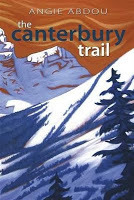 (Brindle & Glass, 2011)
(Brindle & Glass, 2011)
by Angie Abdou
Description (from the publisher website):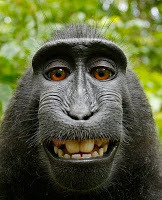 What the Tiny Monkey thinks:
What the Tiny Monkey thinks:
I am sadly not familiar with Geoffrey Chaucer's The Canterbury Tales , so I cannot comment on Angie Abdou's adherence or deviations to the original plot. What I can say is that Abdou is a first-class writer who captures the fluidity and exertions of the human body like few others. While her debut novel The Bone Cage was far more centered around a sports theme, Trail shows that Abdou really knows her stuff when it comes to the white powder and those who live to frolic in it. Abdou understands that sex, drugs, and alcohol are key components of the lifestyle, but she never lets the stereotypes become, well, stereotypical. These ski bums, mountain men, snow bunnies, and extreme snowboarders may be the equivalent of Canadian archetypes, but Adbou cannily subverts our expectations at every turn, finding unexpected pockets of humanity beneath the layers of Gore-Tex. This is not an A-to-Z type of plot; it meanders down back roads and hidden paths, and not every trek is a winner. But the whole is definitely greater than the sum, and for those with a taste for the offbeat and a fearlessness when it comes to a challenge, The Canterbury Trail offers up a plethora of pleasures.
Tiny Monkey Really Likes
 (Brindle & Glass, 2011)
(Brindle & Glass, 2011)by Angie Abdou
Description (from the publisher website):
It's the last ski weekend of the season and a mishmash of snow-enthusiasts is on its way to a remote backwoods cabin. In an odd pilgrimage through the mountains, the townsfolk of Coalton—from the ski bum to the urbanite—embark on a bizarre adventure that walks the line between comedy and tragedy. As the rednecks mount their sleds and the hippies snowshoe through the cedar forest, we see rivals converge for the weekend. While readers follow the characters on their voyage up and over the mountain, stereotypes of ski-town culture fall away. Loco, the ski bum, is about to start his first real job; Alison, the urbanite, is forced to learn how to wield an avalanche shovel; and Michael, the real estate developer, is high on mushroom tea.
In a blend of mordant humour and heartbreak, Angie Abdou chronicles a day in the life of these industrious few as they attempt to conquer the mountain. In an avalanche of action, Angie Abdou explores the way in which people treat their fellow citizens and the landscape they love.
 What the Tiny Monkey thinks:
What the Tiny Monkey thinks: I am sadly not familiar with Geoffrey Chaucer's The Canterbury Tales , so I cannot comment on Angie Abdou's adherence or deviations to the original plot. What I can say is that Abdou is a first-class writer who captures the fluidity and exertions of the human body like few others. While her debut novel The Bone Cage was far more centered around a sports theme, Trail shows that Abdou really knows her stuff when it comes to the white powder and those who live to frolic in it. Abdou understands that sex, drugs, and alcohol are key components of the lifestyle, but she never lets the stereotypes become, well, stereotypical. These ski bums, mountain men, snow bunnies, and extreme snowboarders may be the equivalent of Canadian archetypes, but Adbou cannily subverts our expectations at every turn, finding unexpected pockets of humanity beneath the layers of Gore-Tex. This is not an A-to-Z type of plot; it meanders down back roads and hidden paths, and not every trek is a winner. But the whole is definitely greater than the sum, and for those with a taste for the offbeat and a fearlessness when it comes to a challenge, The Canterbury Trail offers up a plethora of pleasures.
Tiny Monkey Really Likes
Published on September 13, 2011 17:22



